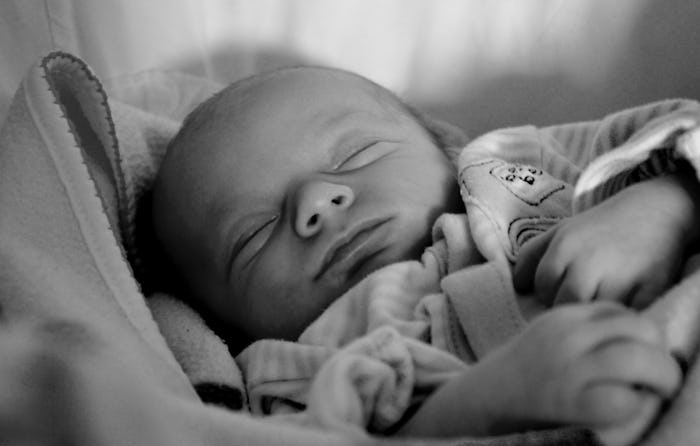The idea of bed-sharing, a form of co-sleeping, has become a somewhat controversial topic among parenting circles in recent years. Advocates for the practice say it promotes bonding and safe sleep, whereas others feel it may put babies at risk of Sudden Infant Death Syndrome (SIDS), or the unexplained death of a baby that often occurs during sleep. So does bed-sharing increase SIDS risk, or can parents safely snuggle up with their infant every night?
First, it is helpful to understand a little more about SIDS. According to the Mayo Clinic, the cause of SIDS is unknown, although it may involve an abnormal development in the baby's brain that takes care of his ability to breathe and wake up from sleep. Although the cause may be biological, environmental factors could also contribute to the syndrome. As further noted by the Mayo Clinic, babies who sleep on their stomach, or on a soft bedding surface, may face additional difficulties breathing and be at risk of SIDS. So what does this mean for sharing a bed with parents?
As with most medical topics, the definitive answer is unclear, although a lot of research supports the idea that bed-sharing may increase your child's risk of SIDS. According to a 2013 study in the British Medical Journal Open, bed sharing for sleep, even when the parents are not under the influence of any alcohol or drugs, does increase the risk of SIDS. As further explained by the study — which analyzed 1,472 SIDS cases — if a baby under the age of three months co-sleeps in bed with a parent, then the infant's risk of SIDS increases five times. But the BMJ was not the only organization to publish such results. As noted by a 2014 piece in Pediatrics, the main risk factor for sleep deaths in infants three months or younger is bed-sharing. This study analyzed 8,207 deaths, of which 69.2 percent of the infants were bed sharing at the time. And although these studies of bed-sharing with an infant are startling, co-sleeping with a baby on a sofa may be even more dangerous. As noted in another 2014 piece in Pediatrics, from 2004 to 2012, 1,024 infant deaths on sofas comprised 12.9 percent of deaths related to sleeping infants in a study of data from the National Center for the Review and Prevention of Child Deaths Case Reporting System database. Basically, these studies have found the practice of co-sleeping with a very young infant on a bed or sofa to increase the child's risk of SIDS.
That said, not every medical professional agrees with this assessment. For instance, as James J. McKenna noted in a 2005 piece from Paediatric Respiratory Reviews, bed-sharing may only be one factor involved in the case of SIDS deaths, and that parents should not be turned away from the possibility of co-sleeping entirely. Furthermore, a 2001 international study from Early Human Development concluded that the practice of bed-sharing may vary in different cultures around the world, and that it was difficult to ascribe the cause of SIDS to any one childcare practice. In other words, the prevalence of SIDS may be due to some other cause entirely. And as Dr. William Sears noted in Parenting, safe co-sleeping may even lower an infant's risk of SIDS.
With so much contradictory information on hand, what's a parent to do? There are some precautions you can take to make your bed-sharing environment as safe as possible, should you decide to take that route for your family. And of course, you can always seek individual advice from your trusted pediatrician.
